In 1964 judo made its Olympic debut in Tokyo, the capital of Japan, giving the world a sport that has been embraced on every continent.
Now, Tokyo is once again preparing to stage ‘The Greatest Show on Earth’ and judo players (judoka) worldwide are dreaming of a chance to represent their countries in a new competition in the sport’s birthplace.
The International Judo Federation has applied to the International Olympic Committee to add an exciting and innovative mixed team event to the schedule, offering judoka a chance to thrill the audience and share the pride of competing with and for their team-mates under the national flag.
“We believe the time is right to introduce team competition to the Olympics in the home of judo,” IJF president Marius Vizer said.
Team events have long been part of the International Judo Federation programme, with the first men’s team world championships held in 1994 and a women’s team championships staged three years later. Today the team competitions are staged as part of the overall Judo World Championships and both men’s and women’s competitions are held for different age categories.
But Olympic Team Judo would break new ground as a mixed competition with national teams of three women and three men at differing weight groups, taking to the mat. A mixed team format has already been successfully operated at the Youth Olympic Games in Singapore and Nanjing.
The Olympic event will feature teams of six comprising three women (-57kg, -70kg, +70kg), and three men (-73kg, -90kg, +90kg) with all athletes having previously competed in the individual event so as not to increase the overall number at the Games.
The competition format will involve at least 12 teams with a quarter-final repechage with the four best teams seeded.
The action will be confined to a single day and held in the facilities used for the previous seven days of the judo programme. That ensures that the competition makes no additional requirements on the Games’ Organising Committee, keeping the proposal in line with the aims and objectives of the IOC’s Agenda 2020 guidelines.
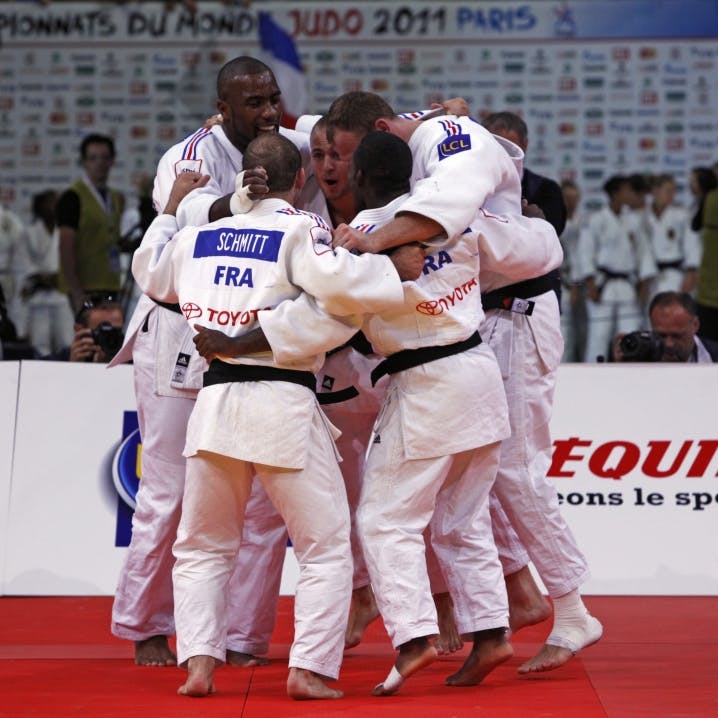
Team ethos
Many sports fans may be surprised to discover that judo is already a successful team sport. After all, when the world watches judo, it sees two players on the mat, apparently in individual competition. But participants and followers of the sport tell another story.
In fact, the first judo competitions in Japan were organised between teams representing various institutions or organisations and, even now in Japan, belonging to such a team – university, police or other squad – remains a prestigious and important aspect of the sport.
“Sure, they may fight alone when the world is watching, but away from the competitive tatami (mat) they are part of a team and a strong team ethos is evident throughout the sport,” explained IJF head sport director Vladimir Barta.
“Judo is one of the most physically demanding sports in the world and has, arguably, the best-conditioned athletes.
“To reach peak condition at the right time, a judoka needs to be matched against the best of their domestic peers in relentless practice to ensure they have the toughest training and to develop the best level of preparation to take on international opposition.
“That means having match after match in free-sparring with team-mates to ensure that a judoka is prepared. In preparation, everybody gives their best, not just to benefit their own performance, but to help others in the team. That is team spirit at work and all of that mutually beneficial hard work comes to fruition in team competition, where judoka is coming not just for themselves, but each other and their nations. “
A place on the Olympic Games schedule is seen as a positive and natural step for a discipline that has proved popular with judoka and the public to date.
At the 2015 team world championships in Astana, Kazakhstan, nations from all five continents were represented as 116 men from four countries and 108 women from 15 countries took to the tatami in the quest for team medals.
The competition was broadcast to over 120 countries with a global cumulative audience of 304.79 million, up a remarkable 70 per cent on the previous year’s Judo World Championships.
Add this to incredible internet impact with 3.3 million page views and close to 600,000 visits to the IJF website during the event and significant activity across its Facebook, Twitter and Instagram accounts and you have a picture of a sport that has succeeded in capturing the imagination of the public worldwide.
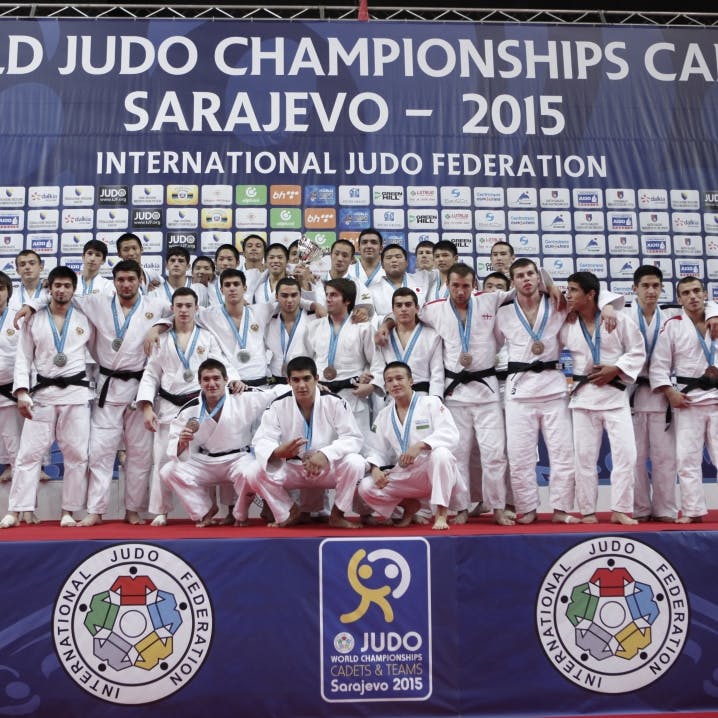
Appetite
Judo insiders say that that there is tremendous appetite for team competition from both fans and the judoka themselves.
“There is no greater honour than representing your country and the judoka respond emotionally as they walk to the mat for the customary team versus team bow ahead of the opening match,” Barta said. “Flags are flying, hearts are racing, the words of an inspirational team talk are ringing in their ears and it is all accompanied by the cacophony of noise from travelling fans trying to out-cheer each other.
“Team competition is judo’s not-so-hidden gem and the atmosphere simply has to be experienced live. It perfectly embodies the Olympic spirit and values and has developed over the years to reach new heights thanks to world-class presentation of the riveting action.”
In many respects the inspiration for the Olympic team event can be traced back to the principles of judo and the sport’s founder, Jigoro Kano, an Olympic pioneer who was an original member of the IOC and a friend of the movement’s founder, Baron Pierre de Coubertin.
The IJF believes that the proposed mixed team competition formula emphasises and promotes the values of respect, excellence and friendship at the heart of the Olympic ideal while, of course, promoting gender equality as men and women compete together, committed as a team to achieving a common goal.
“The competition is about working together as one team with the athletes supporting and encouraging each other, acting as one,” Barta added. “Competing in mixed teams, the athletes will be living examples of gender equity and of peaceful cooperation – a strong message that the world needs to witness. All this is completely and totally in line with the recommendations of Agenda 2020.”
Adding a team competition to the 2020 Tokyo summer Olympic Games will also drive media attention.
The competition will feature judoka who have already been successful at the Games, as well as others who did not get the results they had hoped for. That is sure to produce fierce and fascinating competition as the participants will rely not only on their focus and concentration, but also on their team-mates as they compete for a final gold.
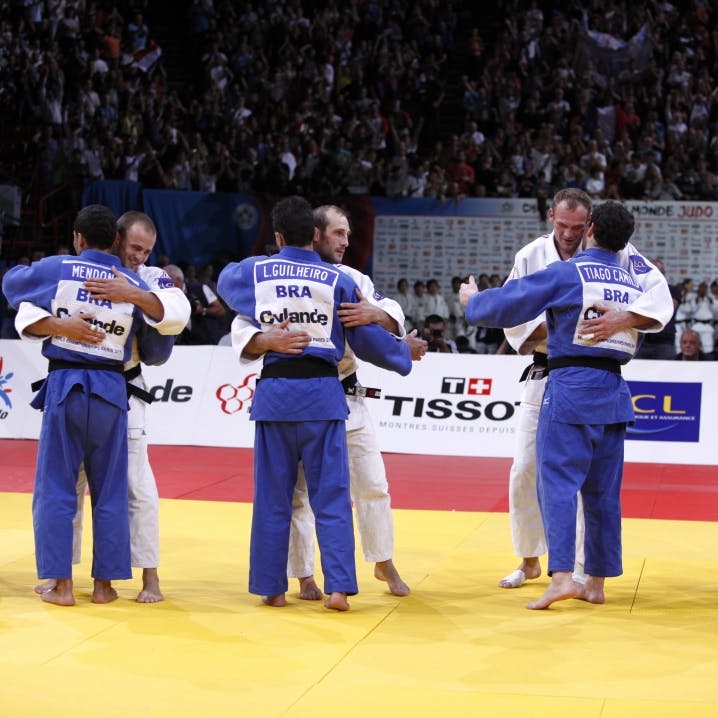
Rewards
The IJF believes the team competition will prove to have special appeal to young people, because it highlights the rewards of working together, sharing responsibility, being empathic and supportive – all the while performing to the full potential and working towards a common goal.
“In a fragile world tormented by conflicts of all kinds, where sport can play a key role in reaching out to young people, the judo team event not only can but will bring together the best of humanity – women and men, showing the importance of friendship, respect, mutual aid and peace,” Barta said.
And while a judo team event has the potential to add significantly to the Tokyo Games and future Olympics, the IJF official says that the benefits to the sport itself are significant.
“For the sport of judo itself, there is this one last positive: giving athletes the chance to compete for one more medal, strengthening the ties among each nation’s representatives, as well as encouraging women’s participation in the sport in well-established and valuable judo nations, will bring considerable benefits, and over many years to come,” he adds.
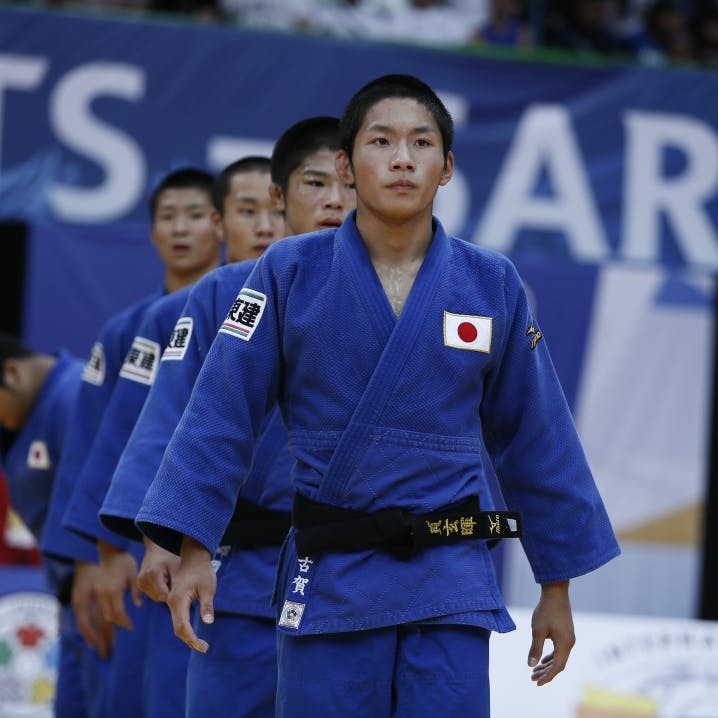
PRESIDENTIAL PERSPECTIVE:
International Judo Federation president Marius Vizer
As the Olympic Games return to Tokyo, where judo made its debut in 1964, how do you assess judo’s Olympic heritage?
“The Tokyo 1964 Olympics was a crucial moment in the evolution of our sport. The Olympic Games’ recognition of judo was in keeping with the values of our founder, Master Jigoro Kano, and showed our sport to a global audience.”
How has being part of the Olympic Games impacted on the global growth of the sport?
“Judo’s membership of the Olympics gave us a new impulse to develop all the media, sporting and financial elements of the sport and it projected judo around the world. The new strategy, adopted in recent years, has raised the standard to its highest level and has sparked a noted increase in judo’s popularity.”
What has the inclusion of judo done for the Olympic Games?
“Judo has set an example in the Olympic movement in terms of values and principles and our sport is considered as one of the most educational in the world. We can transfer our values into society and the educational dimension can impact on all generations. Judo is a dynamic and spectacular sport which is a model of perfect synergy between sport, philosophy and high performance. Professor Jigoro Kano said that judo is the highest expression of mind and body.”
Why is it important that team judo is part of the Olympic programme?
“I believe that judo today is a sport of the highest level and that its development and modernisation have paved the way for one of our greatest attractions – the team event – to be included in the Olympic Games. The addition would be mutually beneficial for the Olympic movement and the IJF. The growth in popularity of the team event over the last 15-20 years has been something we are very proud of and we believe it is one of the most exciting events in world sport. I am confident that the team event can be a great addition to the Tokyo 2020 Olympic Games.”
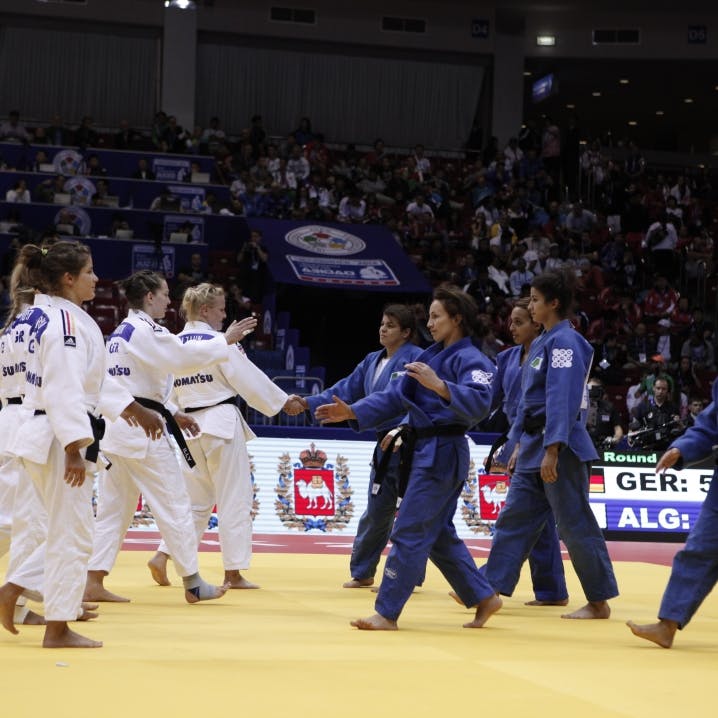
MY VIEW… IJF Hall of Famer and IJF Referee supervisor Neil Adams
How popular is team judo competition with judoka, the public and as a TV product?
“Funnily enough, team competition was a major part of my young development as it seemed to take off the immense pressure of the individual result. However, this worked for me, because I was in the middle of the pack and not the last fighter, who has the job of either making the comeback or clinching the title for the team.
“It creates immense drama and gives us an insight into the personalities of the fighters, as well as the country itself, that you wouldn’t normally see in the controlled individual environment. The national pride exhibited during a team match is both contagious and engaging.
“As a TV product with a knowledgeable commentary, and with it being a mixed gender competition, the excitement and passion will translate phenomenally. Look at the success of TV shows such as The Amazing Race, with the drama and demonstration of each of the individual’s strengths, working towards a team goal.”
What are the key reasons it should be included in the Olympic Games programme?
“Judo would be the first to be a successful mixed gender sport. This is an amazing tool to encourage women’s participation in the sport. This will also help in our sport, gaining more of a foothold in the popular media, hopefully educating the public to enjoy both the individual and team events.”
In what ways would the inclusion of team judo in the Olympic programme benefit the development and popularity of the sport worldwide?
“I think it would make it more accessible as some people are drawn to team activities more than individual sports. Their personality just doesn’t work well under individual pressure. This would provide an opportunity for both.
“The camaraderie and support I have seen demonstrated between team-mates within a team competition has been inspiring and immense. It will show how women and men can work together towards a common goal, using their individual strengths, both mentally and physically, to be successful.”
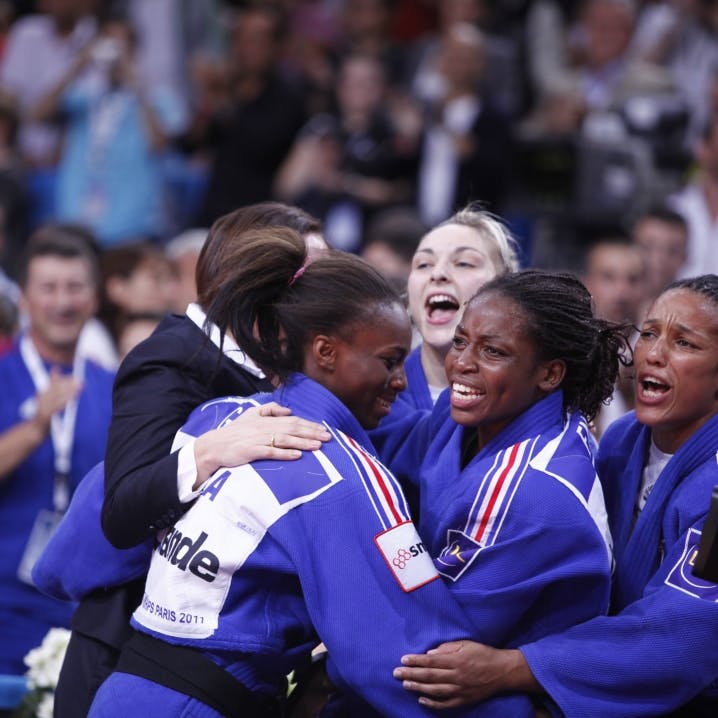
MY VIEW… Judoka Arleta Podolak
Arleta Podolak is 23 years old and represents Poland in the -57kg category. She was the 2016 Almaty Grand Prix winner, won gold with her national team in the 2016 European Team Championships and silver in the 2015 World Team Championships.
What attracted you to the sport of judo?
“My dad told me that it is a very cool sport so both my brother and I started.”
What have been the highlights of your career to date?
“Winning my first Grand Prix medal and then qualifying for the Rio Olympics.”
What is the most memorable event you have taken part in and why?
“It was last year’s fight for the bronze medal at the Paris Grand Slam with Rafaela Silva. I was winning this match but just four seconds before time she threw me… it was so close!”
What does it mean to you to represent your country in this sport?
“It’s a great honour! In Poland I have very good young opponents so it’s great to be No.1 in my country and to represent Polish judo.”
How does team competition affect the atmosphere in the arena?
“I think team competitions are very spectacular for the people who don’t know judo players very well. It is country versus country.”
Why do you think a team competition should be part of the Olympic judo programme?
“I don’t know exactly what the secret of the team competition is. I enjoy both the individual and team competitions, but in the teams I feel less pressure and that can be the secret to producing a winning performance.”
What will a team event add to the Olympic Games and what will it do for the popularity of judo?
“It will capture the attention of the public because it is so spectacular. Other sports, for example, fencing, have a team competition too, and that’s why we can do the same in judo.”